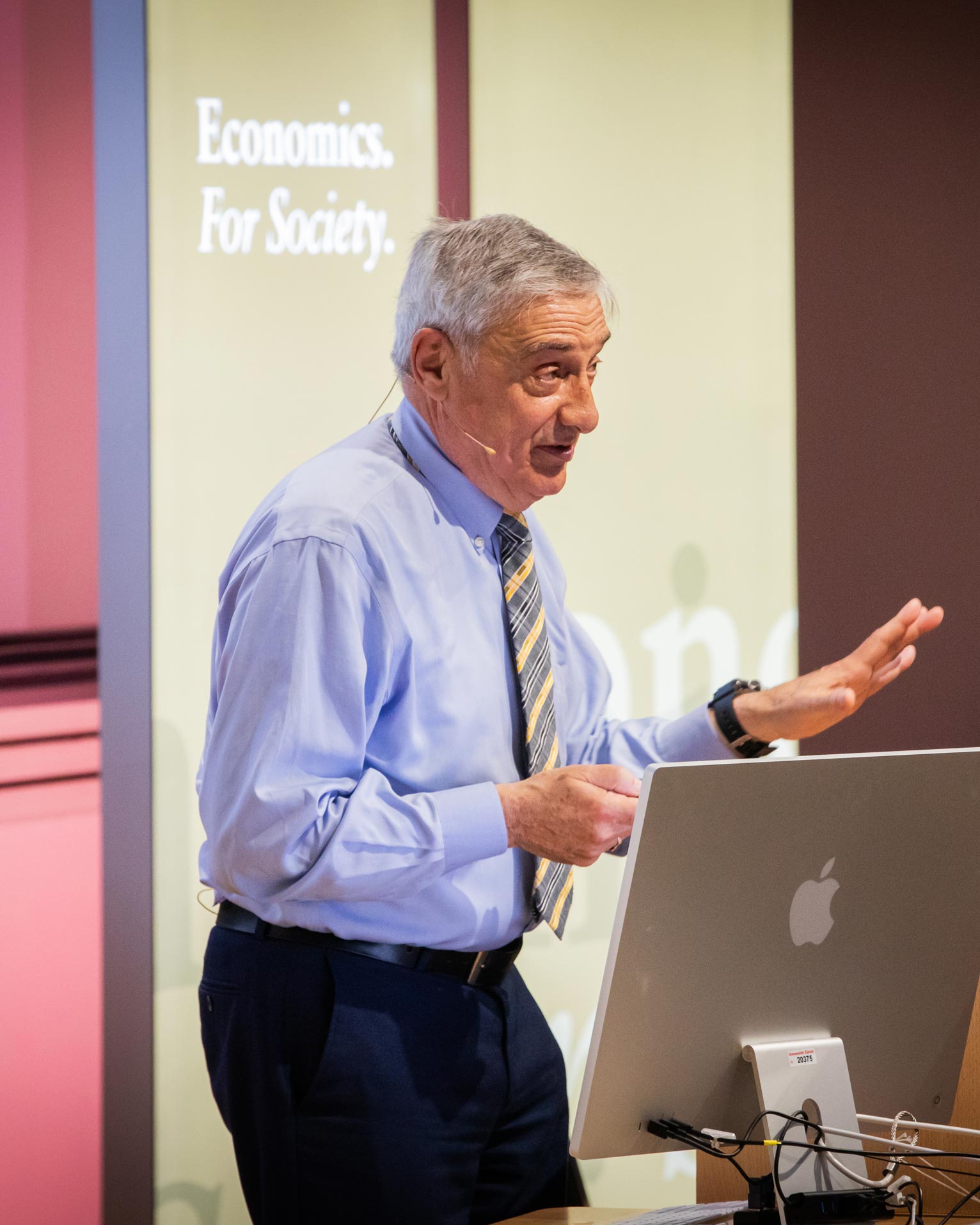Lessons from the Enlightenment
Joel Mokyr’s UBS Center Opinion at the University of Zurich underscored the significance of useful knowledge and the Enlightenment in shaping the economic landscape of Europe, highlighting the unique conditions in Britain that facilitated the Industrial Revolution.
Maura Wyler (Text) & Ueli Christoffel (Images)
Economic historian Joel Mokyr delved into the origins of economic prosperity, focusing on the lessons from the Enlightenment. Mokyr explored the significant economic transformations in Europe, particularly Britain, during the 18th century. Emphasizing the pivotal role of "useful knowledge" in driving the Enlightenment, Mokyr argued that by the eighteenth century, Europe had diverged significantly in terms of knowledge, setting the stage for the Industrial Revolution. This divergence was not present in 1250 AD, as other great Asian civilizations were more advanced in many respects. However, the cultural movement known as the Industrial Enlightenment in the seventeenth and eighteenth centuries propelled the growth of useful knowledge in Europe, particularly in Britain. This era was marked by a belief in progress and the accumulation of knowledge, catalyzed by the printing press, Great Voyages, and innovative tools, which assured that knowledge would not be lost and opened new horizons for discovery.
The British Enlightenment, in particular, was pragmatic and materialistic, focusing on practical solutions and economic advances. The Industrial Enlightenment emphasized two critical actions: generating new insights and inventions and their diffusion to those who could utilize them. Incentives for creating useful knowledge included both pecuniary rewards, such as patents, and non-pecuniary incentives like social status and intellectual recognition. Access to knowledge was equally crucial, facilitated by institutions that reduced the costs of acquiring and mastering new information. Networking and social capital played significant roles in the diffusion of knowledge, with scientific societies and informal gatherings promoting the exchange of ideas.
Mokyr concluded that the Industrial Revolution’s roots lay in the cultural and institutional developments of the Enlightenment. The accumulation and application of useful knowledge were central to the economic development of Europe, explaining why Europeans could sustain growth and innovation. Understanding these historical processes is essential to comprehending the origins of modern economic prosperity.
Joel Mokyr’s UBS Center Opinion at the University of Zurich underscored the significance of useful knowledge and the Enlightenment in shaping the economic landscape of Europe, highlighting the unique conditions in Britain that facilitated the Industrial Revolution.
Maura Wyler (Text) & Ueli Christoffel (Images)
Economic historian Joel Mokyr delved into the origins of economic prosperity, focusing on the lessons from the Enlightenment. Mokyr explored the significant economic transformations in Europe, particularly Britain, during the 18th century. Emphasizing the pivotal role of "useful knowledge" in driving the Enlightenment, Mokyr argued that by the eighteenth century, Europe had diverged significantly in terms of knowledge, setting the stage for the Industrial Revolution. This divergence was not present in 1250 AD, as other great Asian civilizations were more advanced in many respects. However, the cultural movement known as the Industrial Enlightenment in the seventeenth and eighteenth centuries propelled the growth of useful knowledge in Europe, particularly in Britain. This era was marked by a belief in progress and the accumulation of knowledge, catalyzed by the printing press, Great Voyages, and innovative tools, which assured that knowledge would not be lost and opened new horizons for discovery.

The origins of economic prosperity
Speaker
Joel Mokyr is Robert H. Strotz Professor of Arts and Sciences and Professor of Economics and History at Northwestern University. His research focuses on the economic history of Europe, specializing in the period 1750–1914. His current research is concerned with the understanding of the economic and intellectual roots of technological progress and the growth of useful knowledge in European societies, as well as the impact that industrialization and economic progress have had on economic welfare. Prof. Mokyr is co-editor of a book series, the Princeton University Press Economic History of the Western World. He was the 2006 winner of the biennial Heineken Award for History offered by the Royal Dutch Academy of Sciences and the winner of the 2015 Balzan International Prize for economic history. He was elected a distinguished member of the American Economic Association. He is a member of the American Academy of Arts and Sciences, the British Academy, the Accademia dei Lincei and Royal Dutch Academy. Mokyr is the co-recipient of the 2025 Sveriges Riksbank Prize in Economic Sciences in Memory of Alfred Nobel for having identified the prerequisites for sustained growth through technological progress
Joel Mokyr is Robert H. Strotz Professor of Arts and Sciences and Professor of Economics and History at Northwestern University. His research focuses on the economic history of Europe, specializing in the period 1750–1914. His current research is concerned with the understanding of the economic and intellectual roots of technological progress and the growth of useful knowledge in European societies, as well as the impact that industrialization and economic progress have had on economic welfare. Prof. Mokyr is co-editor of a book series, the Princeton University Press Economic History of the Western World. He was the 2006 winner of the biennial Heineken Award for History offered by the Royal Dutch Academy of Sciences and the winner of the 2015 Balzan International Prize for economic history. He was elected a distinguished member of the American Economic Association. He is a member of the American Academy of Arts and Sciences, the British Academy, the Accademia dei Lincei and Royal Dutch Academy. Mokyr is the co-recipient of the 2025 Sveriges Riksbank Prize in Economic Sciences in Memory of Alfred Nobel for having identified the prerequisites for sustained growth through technological progress